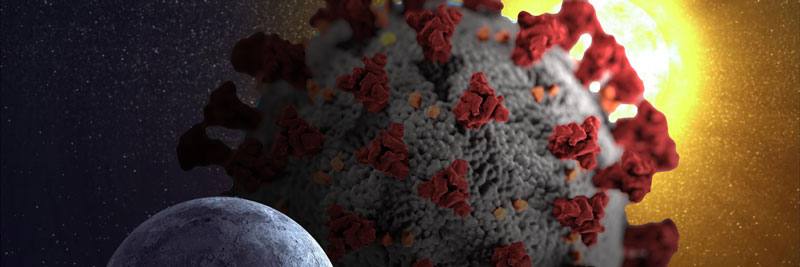Coronavirus Earth

For years, I’ve been meaning to ramp up a new blog for philosophical and religious essays that aren’t really a fit for the Ocean State Current, and it’s been at least a year since I determined that reviving Dust in the Light was the way to go. This year, I resolved to get the redesign done during Lent, but it was a pretty strange 40 days. As it turned out, the reason for my delay (or the excuse) is actually auspicious, because living through the Year of the Virus has been clarifying many ideas with experience that were previously abstract.
In theological terms, interacting with the world via live streaming video has a feel almost of transubstantiation. A couple Sundays ago, my family was setting up to watch our parish’s Mass via Facebook Live or YouTube on our living room television, and technical glitches had me running back and forth between the computer and the TV trying to get the right address for the video. Somehow, the TV wound up a few minutes behind the computer in the ceremony.
In that delay — which isn’t unfamiliar in our recorded, digitized world — was the whole world. When something is happening at that moment, it’s a shared experience, even if the visual has to be transmitted across vast space. When something is recorded, it’s more like a representation. At that moment, the priest is on to other things. At that moment, the person on the video is a representation of what was, not an image of what is.
Here, we have a pretty good illustration of the difference between Christ being present in the Eucharist and His merely being represented symbolically by bread and wine. For Catholics, communion isn’t merely “do this in memory of me,” like a 2,000-year-old recording of the Last Supper. The Person is really there in the video, at that moment.
Another way in which our COVID experience fleshes out abstract thought is in the fear, itself. Almost 16 years ago, in this space, I wrote about efforts to end the process of aging and, therefore, natural death. Advocates for life extensions were doing what advocates always do and proposing that their preferred outcome would have only positives. “Life will be much more valued when it’s so much more under our control,” insisted Aubrey de Grey.
In response, I suggested that people would become more protective of their own lives, but thereby they would become as slaves to those who didn’t value others’ lives. Sure enough, we see evidence for this in our current predicament. As we gain power over more and more illnesses that threaten our lives, one for which we have no treatment is only that much more terrifying — so much so that we will quickly give up our most sacred freedoms to combat it.
If we conquer death in its mundane manifestations, how terrible will be the power of one who threatens to kill us anyway? For good reason did I quote the book of Revelation those 16 years ago concerning humanity’s ability to conquer Satan because “they did not love their lives so much as to shrink from death.”
A third lesson of experience that we’re gaining during these weeks in societal quarantine is the sense of deprivation. As I contemplated spending Easter with no way to receive the Eucharist (or, for that matter, to deliver it to others as a Eucharistic minister), I thought of Martin Scorsese’s movie, Silence. In that film, two Catholic priests infiltrate Japan looking for their mentor, and they find villagers having clandestine services and desperate for religious implements and the blessings of priests. When word spreads that men of the cloth are around, Christians travel from other villages in search of the sacraments. How far might I travel, I wondered, if I had word of some clandestine Mass being celebrated despite the governor’s directives?
We’re soft, these days, and hide from our shadows, but as this crisis, which is centrally a crisis of confidence, drags on and on, we’ll be faced with the need to test our beliefs.
Did I say, “need”? Rather, let me say, “opportunity.”


